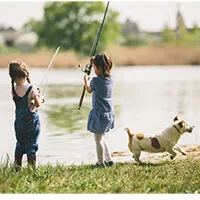All my life I’ve loved dogs. The saying for me is true that, ‘Dogs are a Man’s Best Friend’. Yet, sometimes it’s hard to find a ‘best friend’ who fits your lifestyle. It takes lots of research. I’ve had my dog Deutsch now for about 7 years. And although I love him, I won’t purchase our next family dog the same way I bought Deutsch. Here’s why:
I got him from a dog rescue agency that knew little about him. They didn’t know his breed, his age, or his past. All they knew was that he was a rescue dog from an abusive owner. He (Deutsch) was timid and fearful of many things. I took pity on him and adopted him.
He has been a good dog but he isn’t exactly what I was expecting. He still (even 7 years later) hunkers over and he keeps to himself. He is very afraid of water (lakes, rivers), loud noises, thunder, and other random things. He doesn’t like to be touched and he’d rather keep to himself. I’m happy I rescued him and I love him but he is not an ideal family dog. Although harmless, he won’t let my son come close to him. I’ve paid for a trainer and worked with him but he won’t change.
He is getting old (they guessed he was 3-5 years old when I adopted him so he is somewhere around 10-12 years old) and I think that he only has a year or so left. As a result, I have been actively researching different breeds of dogs.
Sometimes purebreds are the best option. When choosing a purebred you can pretty much predict a lot of the personality characteristics that a dog will have. You know what size they will become and can find information more easily on how to care for them and their coat. You also have control over choosing a dog whose parents you can observe or meet (or ask the breeder about). And finally, when you go with an AKC (American Kennel Club) breeder you have the peace of mind that the breeder is actually a great dog owner!
If you are buying from breeders, there are certain questions that need to be asked. Here are a few to ask:
- Visit the breeder’s home or kennel and ask to see at least one of the puppy’s parents. Get an idea of what the future holds for your dog in terms of temperament and appearance.
- Pay attention to how the dogs and puppies interact with their breeder. Does the breeder appear to genuinely care for the puppies and their adult dogs? Both dogs and puppies should not shy away from the breeder and should be outgoing with strangers.
- Don’t leave the premises without the appropriate documentation of the dog’s pedigree, a.k.a. “papers.” The words “American Kennel Club” as well as the AKC logo should be clearly visible. You’ll need to send in this application form to register your dog with the AKC. Be wary of a breeder who refuses/hesitates to give you papers, wants to charge you more for AKC papers, offers papers from a registry other than the AKC, or tells you he/she will mail them to you at a later date.
Another reason why I’ll go with AKC, is that they perform thousands of inspections each year to verify the breeders. The dogs that are AKC registered have higher quality breeding because of these inspections.
As mentioned before, when I got my dog Deutsch, I didn’t know anything about him. I didn’t know what his temperament would be, what breed he was, who his parents were, or who raised/abused him. And because I was single at the time, I felt like I could handle the unknown. And although its worked out okay, now that we have children we can’t afford to take that risk.
I love purebreds that are very family and kid friendly, loyal, and happy dogs. I also really like a quiet and calm dog that won’t annoy neighbors. After much research we’ve decided when we buy our next dog, we will be getting a purebred Greater Mountain Swiss, English Mastiff, Bernese Mountain Dog, or the Great Pyrenees. These breeds are all great with children, calm, quiet, loyal, and friendly.
Golden Retreivers also fit that description, but I like the looks of the aforementioned dogs better.

Maybe your best match would be a more energetic dog like a lab, or a kind/resolute smaller dog like an French Bull dog.
Perhaps a beautiful head turning and affectionate dog like a Malamute or a Great Dane would be a good fit. Whatever your needs, researching the dogs that meet them (fit your lifestyle) and then purchasing one whose parents exemplify those qualities is going to really help you find ‘your best friend’.
I am not against rescuing dogs, I really love Deutsch and I’ve given him a great life. Further, he has added a lot to my life as well. If you are buying from a shelter/rescue group I recommend checking out the AKC Rescue Network! Keep in mind when you are rescuing a dog there are certain questions that need to be asked. Here is a great resource of questions, but a few that stuck out to me are:
- Why is this dog in a shelter? Was he surrendered by the previous owner, is it a stray, or a rescue? Why did the owner surrender him? If he was a stray, where was he found and in what condition? Is the dog from the local area? Is the dog here because of an animal cruelty charge against its previous owner?
- Does the dog have suitable good manners that I could take away his food bowl while eating or remove his toy while playing? What training and socialization has the dog received since entering the shelter?
- Does this dog require any special medical care, ongoing treatment, dietary restrictions, or additional socialization?
- Will the shelter take this dog back if it doesn’t work out with my family?
When you are ready to find a best friend who fits your lifestyle I hope using these tips help.






Best Match Pet
Friday 26th of July 2024
[…] Lives of dogs and cats from shelters are like an open book. So when you pick a rescue, there’s no need to guess what kind of personality you’re going to deal with once you get them settled in your home. Shelters record information about their animals. They will readily share them with you and so you have a preview on what to expect. Best Match Pet […]
de
Saturday 4th of October 2014
Some good dog trainers will go to the shelter and do a sort of personality evaluation on your potential best friend if you choose to rescue rather than buy from a breeder. Our favorite trainer charges $40 to do this.
Anita Fowler
Monday 6th of October 2014
Great idea! I've never even heard of this. Thanks for sharing!
Sunny
Monday 28th of July 2014
My family raises Bernese Mountain Dogs, and they are just awesome. One characteristic of the breed is an "aloof" nature, and you do need to give them good puppy socialization and training, or they can become shy and distrusting with strangers. With proper socialization and a bit of good genetics (meet the parents!), they can be happy, friendly dogs. That puppy training and socialization is vital though.
Our Berners are perfect for our family … they stay close to their people, love us dearly, and adore being with us. This is one reason that Berners do very well as indoor, family dogs. If left alone too long, they can get depressed, anxious, and show their stress in destructive behavior. Most dogs are like this to an extent, but Berners were raised to be alongside their owners always, whether pulling a milk cart, or snuggling up during the long snowy Alpine winters - that is the purpose that has been ingrained in this breed. Oh, and be prepared for 2x a year blowing of their coat (heavy shedding). We can tell when one of our Berners is blowing their coat, because there will be "Tumble-Furs" around (we call them that because the clumps of fur move like tumbleweeds).
With all dogs, especially large breeds, do your homework! Don't just trust that an AKC breeder is doing everything in the best interest of you and your future puppy. Ask what health testing and certificates they have for each dog. With Bernese Mountain Dogs, you want a puppy from parents who have good results on hip testing either through OFA or PenHip. This does not guarantee that your puppy with never have trouble (some of that can be caused by diet, over exercise, etc), but it will really help your odds! Just research the breed and ask LOTS of questions!
Best of luck with your search for your family's next best friend!
Anita Fowler
Monday 28th of July 2014
Thanks so much! Great information. I appreciate you taking the time to leave this informative comment. I learned a lot and I'm sure others will too :)
StoneMaven
Friday 18th of April 2014
I love Pyrs and Pyr mixes and have owned many, including my current 3yr old rescue male. A word of caution about the characteristics of the breed - these seem to be the big reasons they wind up in shelters.
Pyrs dig. I have big, dog-length hollows dug all over my property. They tend to do this more in the heat than in the winter. I had a wolfhound/mastiff cross that did this too, it may be a molosser thing. You learn to live with it.
They are smart. Border collie smart. They learn what you teach them, good and bad, _very_ quickly. One should never hit or frighten a Pyr (or any dog) for correction, they can get head shy or just human shy quite quickly. It seems to be a common misconception down here that they need to be raised with their stock and handled as little as possible so they bond with the animals instead of humans - not true. It is tough to rehab a pyr that has been hit for correction or one that has been subjected to the practice of being raised without human interaction. I haven't had any dominance issues with my pyrs except between dogs, so there's no need for being gruff and "alpha" with them during training. They are huge marshmallows as far as "their" people are concerned. I haven't had any stranger aggression in mine, but I have seen it in others' livestock guardian pyrs on occasion. They calmed down when their owner told them to, but were disturbed that we were "messing with their animals".
They roam. Both my males and females did this. They patrol an area that seems to be around 5sq miles if they can get out to do it. It's a rare pyr that stays put. You'll need good fences. They like to have a job or they get bored. I keep dairy goats, so this isn't as much of an issue for me, but it might be for folks with a yard dog.
That said, you will never find a more loving, laid back, family protector than a pyr or pyr mix.
Anita Fowler
Friday 18th of April 2014
StoneMaven- Thank you for this information! I never knew a lot of this. It sounds like you are very experience with Pyrenees and Pyr mixes. Great info for me and anyone who is interested in owning one! I appreciate it!
Jill
Friday 18th of April 2014
I have owned and probably will own nothing but mutts for the rest of my life. I currently have a Jack Russell Terrier/Rat Terrier mix and a Lab mix. One came from a friend, and the Lab Mix came from the shelter. She was turned in because her owner didn't pay attention to her and she kept digging her way into the neighbors yard. She's taken constant and consistent training, but to me, it's been worth it.
I was a dog groomer for several years, and can tell you of your choices, I love the Bernese Mountain Dog. I groomed one named Andre, and adored him. He usually sat on my feet while I groomed other dogs.
I am not against buying a purebreed. My brother was so in love with my Great Dane/Lab mix that when she passed he purchased a Blue Merle Great Dane. BUT, there are downsides to owning purebred animals as well. Some are prone to a disorder called "rage disorder". Others continually have issues such as hip dysplacia (all sizes). There are breathing disorders in dogs with shorter snouts etc.
From my experience with dogs, it is better to chose an animal based on your abilities to be its leader. My Jack Russell goes through a brat phase every 2-3 months. While temperment can be bred a certain way, some dogs are still going to be submissive and some will still be dominant. Some will test you and some will always follow your lead. It depends on the dog, not the breed.
P.S. I hope with the breeds you've chosen you read my post on shedding! They all shed like crazy! :D
Anita Fowler
Friday 18th of April 2014
Jill- Thanks for the info, I really appreciate it. That is really sweet about Andre the Bernese Mountain Dog! Great advice to choose a dog based on your ability to be its leader! I think all dogs are subject to something. Many mixes have issues too. I know my dog has pretty bad arthritis and some hip problems. It is important to do the research. That's awesome you rescued a dog. And I'll have to check out your post on shedding... We had an English Mastiff for a few years (he died rather tragically). He was the sweetest, gentlest, quietest, most loyal dog I had ever met. I wasn't crazy about his looks to begin with but since he was my husbands dog (he had him and I had Deutsch when we met) I was happy to have him. It only took a few weeks for me to fall in love with him. Mastiffs are great dogs all around. He didn't shed much. I can imagine the other three probably do a lot though! I'll have to keep that in mind when narrowing down to one of the four. Thanks for the info!.